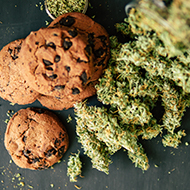Canadian researchers report rise in cannabis poisoning in dogs

The relaxation in cannabis use in the US has given dogs greater access to THC-containing cookies and cakes.
Researchers in Canada have reported a rise in the number of dogs accidentally consuming products containing THC - the compound in cannabis that produces the sensation of feeling “high”.
Writing in the journal PLOS Global Public Health, scientists note a link between areas of North America that have legalised cannabis and reports of cannabis poisoning in dogs – and suggest that this trend may be on the rise.
“There does appear to be a general increasing trend in severe cannabis poisoning events in pet dogs in the US,” the researchers conclude. “This trend highlights the growing need to understand the effects of human cannabis use on pet dogs and a need to educate the public and veterinary communities on identifying and providing care for cannabis poisonings.”
In the study, researchers at the University of Guelph examined the differing factors between cannabinoid and non-cannabinoid reports to the ASPCA's Animal Poison Control Centre.
Their findings reveal a marked increase in reports of cannabis poisoning in dogs, especially in areas that had legalised cannabis. In the US, control measures on cannabis range across states from legal to medical use only and illegal.
The study also found that accidental poisoning is more common in areas with high-income variability, in urban rather than rural areas, and in smaller, male and intact dogs.
According to the Veterinary Poisons Information Service (VPIS), the clinical effects of cannabis toxicity in dogs are comparable to those seen in humans. Of 286 cases with follow up presented to the organisation, the most commonly reported were dilated pupils, drowsiness, vomiting ataxia, and hyperaesthesia.
Researchers believe that relaxing the restrictions in the US led to a rise in cannabis use among people, giving dogs greater access to products like THC-containing cakes and cookies.
"We have evidence that dogs are being exposed to cannabis more frequently throughout the study,” said co-author and PhD candidate Mohammad Howard-Azzeh. “If there’s more cannabis in the environment, there’s more opportunity for dogs to eat it."
“With less stigma surrounding cannabis use and no penalties for using it in states where it’s legal, people will have less fear about calling to report that their dog has been poisoned. That may explain in part the sharp increase in reported cases of poisoning in dogs in recent years.”
The study is the first of its kind, and researchers hope it will prepare the veterinary professions for what to expect if and when cannabis is legalised.
“We hope this study spreads awareness of the potentially harmful effect cannabis may have on dogs and highlights the need for people to better safeguard these types of products from vulnerable populations,” said Howard-Azzeh.



 The Veterinary Medicines Directorate (VMD) is inviting applications from veterinary students to attend a one-week extramural studies (EMS) placement in July 2026.
The Veterinary Medicines Directorate (VMD) is inviting applications from veterinary students to attend a one-week extramural studies (EMS) placement in July 2026.